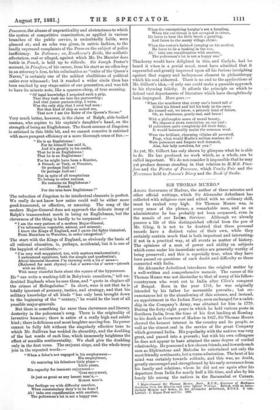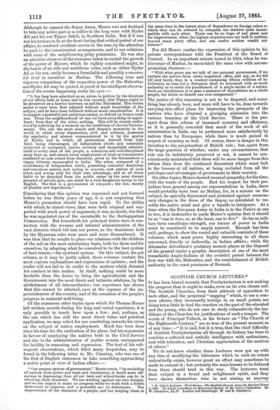SIR THOMAS 3117NRO.*
AMONG Governors of Madras, the author of these minutes and other official writings, which Sir Alexander Arbuthnot has collected with religious care and edited with no ordinary skill, must be ranked very high. Sir Thomas Munro was, in every sense of the phrase, a remarkable man, and as an administrator he has probably not been surpassed, even in the annals of our Indian Services. Although we already possess a life of this distinguished official from the pen of Mr. Gleig, it is not to be doubted that these personal records have a distinct value of their own, while they certainly contain much that is both important and interesting, if not in a practical way, at all events as matter of history. The opinions of a man. of power and ability on subjects which come under his immediate notice are generally worthy of being preserved ; and this is especially true, when they have been passed on questions of such doubt and difficulty as those connected with India.
Sir Alexander Arbuthnot introduces the original matter by a well-written and comprehensive memoir. The career of Sir Thomas Munro was not dissimilar to that of many of his fellow- countrymen who went out to India after Clive's conquest of Bengal. Born in the year 1761, he was originally intended by his father for mercantile pursuits ; but cir- cumstances led to the abandoning of this scheme, and instead, an appointment in the Indian Navy, soon exchanged for a cadet- ship in the Company's Army, was obtained for him in 1779. During the forty-eight years in which he held various posts in Southern India, from the time of his first landing at Bombay to his death as Governor of Madras in 1827, Sir Thomas Munro showed the keenest interest in the country and its people, as well as the utmost zeal in the service of the great Company which governed India. His popularity with the natives was very great, and passed into a proverb ; but with his own colleagues he does not appear to hage attained the same degree of cordial relationship. He possessed a few chosen friends, and towards such men as Elphinstone and Malcolm he entertained not only the most friendly sentiments, but a warm admiration. The bent of his mind was certainly towards solitude, and this was, no doubt, greatly encouraged and strengthened by his early severance from his family and relations, whom he did not see again after his departure from India for nearly half a life-time, and also by his lonely life among the natives in the Baramahal or Canara.
• Major-General Sir Thomas Munro, Bart.. 'C.C.S., Governor of Madras—. Selections from his Minutes, and other Official Writings. Edited, with an Intro- ductory Memoir and Notes, by Sir Alexander Arbuthnot, KO.S.I. S Yoh. London: C. Kegan Paul and Co. 1881.
Although he entered the Sepoy Army, Munro was not destined to take any active part as a soldier in the long wars with Hyder Ali and his son Tippoo Sahib, in Southern India. But if it was not his fortune to be at the front daring that critical period of our affairs, he rendered excellent service in the rear, by the attention he paid to the commissariat arrangements, and to our relations with some of the neighbouring petty potentates. He was also an attentive observer of the measures taken to curtail the growth of the power of Mysore, which he rightly considered might, in the hands of an able and ambitious ruler, such as either Ryder All or his son, easily become a formidable and possibly a success- ful rival to ourselves in Madras. The following true and vigorous comparison of the respective power of the Mahrattas andHyder All may be quoted, in proof of his intelligent observa- tion of the events happening under his eyes :— " It has long been admitted as an axiom in politics by the directors of our affairs both at home and in this country, that Tippoo ought to be preserved as a barrier between us and the Mahrattas. This notion seems to have been first adopted without much knowledge of the subject, and to have been followed without much consideration. It is to support a powerful and ambitious enemy, to defend us from a weak one. From the neighbourhood of one we have everything to appre- hend; from that of the other, nothing. This will be clearly under- stood by reflecting for a moment on the conditions of the two Govern- ments. The one the most simple and despotic monarchy in the world, in which every department, civil and military, possesses the regularity and system communicated to it by the genius of Ryder, and in which, all pretensions derived from high birth being discouraged, all independent chiefs and zemindars subjected or extirpated, justice severely and impartially adminis- tered to every doss of the people, a numerous and well-disciplined army kept up, and almost every employment of trust or consequence conferred on men raised from obscurity, gives to the Government a vigour hitherto unexampled in India. The other, composed of a confederacy of independent chiefs, possessing extensive dominions and numerous armies, now acting in concert, now jealous of each other, and acting only for their own advantage, and at all times liable to be detached from the public cause by the most distant prospect of private gain, can never be a very dangerous enemy to the English. The first is a government of conquest ; the last, merely of plunder and depredation."
Considering that this opinion was expressed and put forward before he was thirty years of age, it is not surprising that Munro's promotion should have been rapid. To the ability with which he stated views, that were both original and sup- ported with much power of argument, it was, no doubt, due that he was appointed one of the secretaries to the Seringapatam Commission. But henceforth his principal duties were in con- nection with the revenue and internal administration of the vast districts which fell into our power, as the dominions held by the Mysorean ruler were more and more dismembered. It was then that he sought to place our relations with the children of the soil on the most satisfactory basis, both for them and for ourselves, by adopting what he conceived to be the best system of land tenure,—the ryotwari system. On this subject, his pet scheme, as it may be justly called, these volumes contain the most copious explanations and expressions of opinion ; and the reader will not fail to do credit to the motives which dictated his conduct in this matter. In itself, nothing could be more laudable than the desire to bring the agriculturist and the Government into the most direct and intimate relations, by the abolishment of all intermediaries ; but experience has shown that this cannot be attained, save at the expense of the im- poverishment of the country, and of the cessation of the people's progress in material well-being.
Of the numerous other topics upon which Sir Thomas Munro left written records during his long and varied experience, it is only possible to touch here upon a few; and, perhaps, as the one which has still the most direct value and practical application, we may select for our concluding remarks his views on the subject of native employment. Much has been done since his time for the realisation of his plans, but his arguments in favour of employing the natives both in the Civil Service and also in the administration of justite remain unsurpassed for lucidity in reasoning and expression. The text of his sub- sequent observations, which filled many despatches, may be found in thefollowing letter to Mr. Canning, who was one of the first of English statesmen to take something approaching a native point of view of Indian affairs :- " Oar present system of government," Munro wrote, " by excluding all natives from power and trust and emolument, is much more effi- cacious in depressing, than all our laws and school-books can do in elevating, their character. We are working against our own designs, and we can expect to make no progress while we work with a feeble instrument to improve, and a powerful one to deteriorate. The improvement of the character of a people, and the keeping them at
the same time in the lowest state of dependence on foreign rulers to which they can be reduced by conquest, are matters quite incom- patible with each other. There can be no hope of any great zeal for improvement, when the highest acquirements can lead to nothing beyond some petty office, and can confer neither wealth nor honour."
Nor did Munro confine the expression of this opinion to his private correspondence with the President of the Board of Control. In an important minute issued in 1824, when he was Governor of Madras, he enunciated the same view with uncom- promising clearness :-
" With what grace can we talk of our paternal government, if we exclude the natives from every important office, and say, as we did till very lately, that, in a country containing fifteen millions of in- habitants, no man but a European shall be entrusted with so much authority as to order the punishment of a single stroke of a rattan. Such an interference is to pass a sentence of degradation on a whole people, for which no benefit can ever compensate."
The justice of this reasoning is not to be disputed, and some- thing has already been, and more will have to be, done towards carrying into effect plans for improving the prospects of the natives who have obtained a grudging admission into the- various branches of the Civil Service. There is the pro- spect from this reform of increased economy and efficiency, as it is generally conceded that mach of the work of ad- ministration in India can be performed more satisfactorily by natives than by Europeans, while there is much gained in respect of economy as well. Of course, there is danger in this direction to the perpetuation of British rule ; but, apart from the large question of whether, under any circumstances, that rule can be indefinitely preserved or not, it cannot be con- scientiously maintained that there will be more danger from this reform than from the continued discontent which must lurk in the bosoms of all natives, at being excluded from all the privileges and advantages of government in their country.
On other topics, Munro showed unusual sympathy, for his time, with the wants of the people. Had his respect for their pre- judices been general among our representatives in India, there would probably have been no Mutiny, for, in a minute on the
• he specially deprecated and protested against unneces- sary changes in the dress of the Sepoy, as calculated to un- settle the native mind and give a handle to intriguers. At a time when the European Army in India is to the Native as one to two, it is instructive to quote Munro's opinion that it should_ be as " one to four, or, at the least, one to five." So far as mili- tary force constitutes strength, our tenure of power in India must be considered to be amply assured. Enough has been said, perhaps, to show the varied and valuable contents of these volumes, which must prove highly interesting to all those concerned, directly or indirectly, in Indian affairs ; while Sir Alexander Arbuthnot's prefatory memoir places at the disposal of the general reader a graphic description .of one of the most remarkable Anglo-Indians of the eventful period between the first war with the Mahrattas, and the establishment of British authority in the coast provinces of Bnrmah.































 Previous page
Previous page